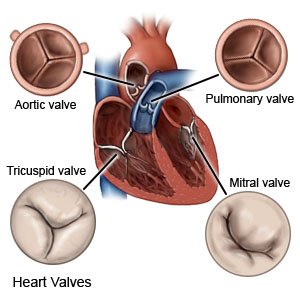Mitral Valve Replacement
Medically reviewed by Drugs.com. Last updated on Aug 4, 2025.
What do I need know about mitral valve replacement?
Mitral valve replacement is open heart surgery to replace all or part of the mitral valve. The mitral valve normally opens and closes to let blood pass through the heart. If your mitral valve is damaged, blood may not flow as it should through your heart.
 |
How do I prepare for mitral valve replacement?
Your healthcare provider will tell you how to prepare for your valve replacement surgery. Make arrangements to be in the hospital for up to 2 weeks after surgery. You may be admitted to the hospital the day before your surgery is scheduled. You will have tests to help healthcare providers plan for your surgery. Your surgeon will talk to you about the surgery and what to expect. You will not be able to eat or drink after midnight the night before your surgery.
Related medications
Treatment options
The following list of medications are related to or used in the treatment of this condition.
What will happen during my surgery?
- You will be given general anesthesia medicine to make you sleep. One or more incisions will be made in your chest. Healthcare providers will connect your heart to a heart-lung bypass machine. This machine does the work of your heart and lungs during surgery.
- Part or all of your mitral valve will be removed. Your mitral valve will be replaced with a tissue valve or mechanical valve and sewn in place. Healthcare providers may put wires your chest that stay in for a short time after surgery. The wires can be used to improve your heartbeat. The bypass machine will be removed, and your own heart and lungs will start working again. The incision in your chest will be closed with stitches or staples and covered with a bandage. The bandage keeps the area clean and dry to help prevent infection.
What should I expect after my surgery?
- You will be monitored until you are awake.
- You will spend up to 2 days in the intensive care unit (ICU).
- A physical therapist will help you get up and walk after your surgery.
- You will need tests to make sure your heart is working properly.
What are the risks of mitral valve replacement surgery?
- You may bleed or get an infection during or after surgery. After surgery, your new valve may not work or your heart may not beat as it should. Over time the new valve or area around it may become damaged. Symptoms you had before the surgery may come back or get worse after surgery. You may need to have heart valve surgery again.
- You may get a blood clot in your arm or leg. This may become life-threatening. You may need medicine to prevent blood clots for the rest of your life after your surgery.
Care Agreement
You have the right to help plan your care. Learn about your health condition and how it may be treated. Discuss treatment options with your healthcare providers to decide what care you want to receive. You always have the right to refuse treatment. The above information is an educational aid only. It is not intended as medical advice for individual conditions or treatments. Talk to your doctor, nurse or pharmacist before following any medical regimen to see if it is safe and effective for you.© Copyright Merative 2025 Information is for End User's use only and may not be sold, redistributed or otherwise used for commercial purposes.
Learn more about Mitral Valve Replacement
Treatment options
Symptoms and treatments
Further information
Always consult your healthcare provider to ensure the information displayed on this page applies to your personal circumstances.
